A year after 31 died in landslide near Genting Highlands, wounds remain raw and questions unanswered
Some families of victims in the Batang Kali landslide at Father’s Organic Farm have started a fact-finding mission to determine who they will sue should they pursue legal action.
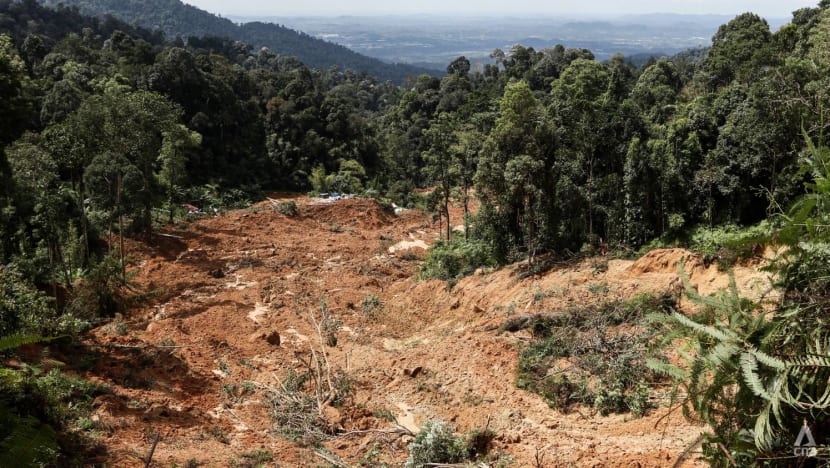
A landslide hit the Father's Organic Farm campsite in Batang Kali near Genting Highlands on Dec 16, 2022. (File photo: CNA/Fadza Ishak)

This audio is generated by an AI tool.
KUALA LUMPUR: On the evening of Dec 15, 2022, Mr Leong Kim Meng and Mr Wong Wai Foong, together with their families, wrapped up an alfresco steamboat dinner in a campsite on the idyllic hills of Father’s Organic Farm, near the popular resort of Genting Highlands.
They chatted in the cool night, excited about going for a trek the next day on what was supposed to be just another yearly family vacation. Past 11pm, they retired to their tents.
Little did they know that in the next few hours, they would be caught up in one of Malaysia’s worst disasters in terms of death toll.
At around 2am on Dec 16, a slope above the campsite crumbled, sending a first deluge of earth and mud crashing down. The debris that pooled at the foot of the slope then caved in, triggering a second landslide that swept through the entire campsite, burying tents filled with vacationers and sending cars tumbling down the hill.
A total of 92 people were at the campsite when it happened. The two men and their families survived, but others were not as lucky.
In total, 31 people died: 18 adults and 13 children. This toll is only second to the 1993 Highland Towers condominium collapse in Selangor, which was also caused by a landslide and claimed 48 lives.
An official government report on the Batang Kali landslide was released in October this year following repeated delays, citing heavy rainfall as the main cause of the incident. It found no concrete evidence to show that human activities contributed to the landslide.
For victims’ families who waited 10 months in hopes of closure, the report was a kick in the teeth. It did not address some of their most burning questions, like why the campsite land - once considered environmentally sensitive - was eventually allowed to be developed, they said.
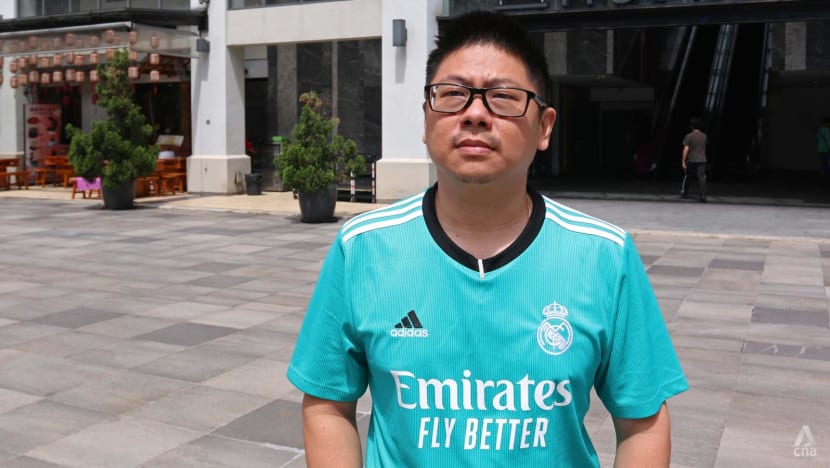
Mr Ling Mung Siang, who lost his wife Liu Pei Si in the tragedy, said some victims’ families were considering legal action.
They have engaged a lawyer and started a fact-finding mission, including gathering details on Father’s Organic Farm, the landowners Malaysia Botanical Gardens Resort, and the government agencies in charge of maintaining the area.
This would determine which parties they could realistically sue. “We just want someone to take responsibility for this case,” said Mr Ling, 43, who was not at the campsite when the landslide happened.
CNA sourced details from the official report and spoke to survivors, victims’ families and rescuers to recreate an account of that tragic evening. Here is their story:
Friday, 2am: A loud explosion
Mr Leong, a 58-year-old retiree, was sleeping in the tent with his wife and daughter when a loud boom reverberated across the hills.
The tent shook and collapsed as earth poured in and pinned his legs. “I turned and tried to get up, but I was trapped,” Mr Leong said.
He shouted for help. Mr Wong, already outside the next tent, joined Mr Leong’s daughter in digging him out with their bare hands.
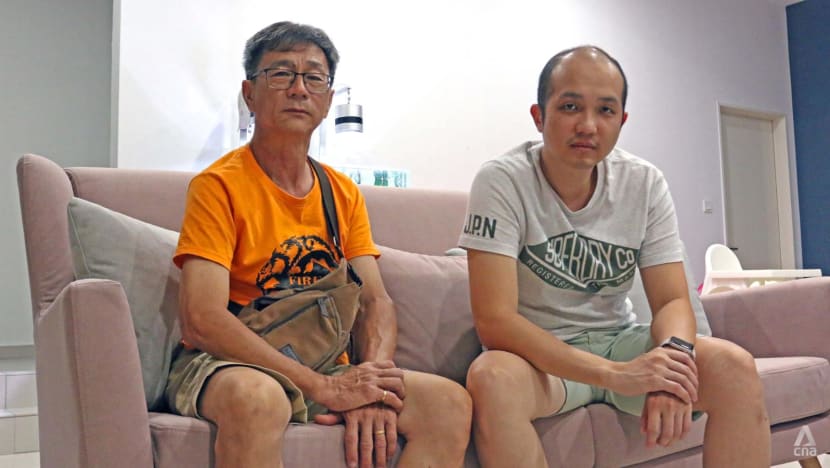
The two families emerged largely unscathed and surveyed their surroundings. It was pitch black, but they could see the damage - nearby tents were torn apart by falling trees and branches.
The dead silence was soon pierced by another crashing sound, possibly from the second landslide. The families started to run. They stumbled upon another group of campers, who led the way to a trail onto higher ground.
Mr Leong lagged behind, but he kept running. “We could not help anybody else already,” he said.
Friday, 2.35am: The emergency call
Senior Fire Officer II Mohd Zapri Zabidi, a firefighter with the Selangor Fire and Rescue Department, was returning from battling a vehicle fire when his team got a call to respond to a landslide on the road from Batang Kali to Genting.
Landslides were common in the area they operated in from their base at Kuala Kubu fire station, so he did not think too much about it.
At about 2.55am, Mr Zapri and his crew pulled up to the affected road slowly, wary that it could also give way in secondary landslides. “We couldn’t see anything or anyone; we only heard the sound of water,” he said.
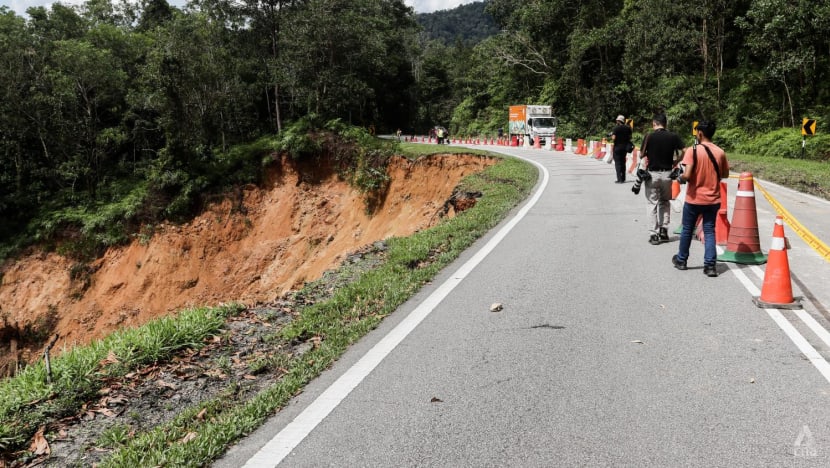
The firefighters, assuming it was just another typical, small-scale landslide, prepared to close the road and issue the usual advisory to motorists. But more information, hampered by patchy reception in the area, trickled in.
“It was only when we arrived that we knew that a campsite and about 100 people were involved,” said Mr Zapri, 39. His commander immediately called for reinforcements.
The firefighters drove along the road and found the entrance to Father’s Organic Farm. The gates were locked, so they climbed over and walked in. Soon they saw multiple cars in the area, some mangled and overturned.
This was confirmation of the sheer number of people involved.
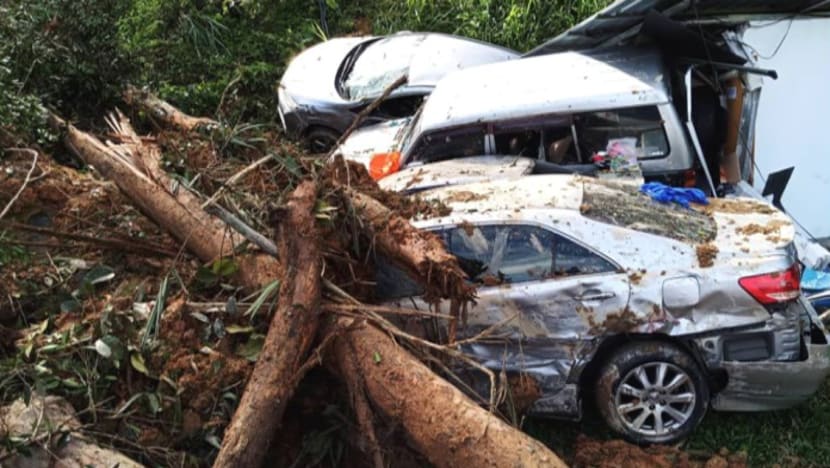
Mr Zapri and his colleagues sprang into action, scouring the campsite in their heavy boots and helmets in search of survivors. The soft earth made walking difficult, so they traversed the more solid edges of the hills that were untouched by the landslide.
The firefighters reached the first camping ground that was closest to the entrance - which rescuers would later call Sector C - where Mr Leong, Mr Wong and their families were.
The authorities - in the search for survivors - had divided the campground into several sectors for ease of rescue operations.
Thirty-eight campers had gathered there, and they were eventually brought out to a holding area nearer to the entrance.
The firefighters went deeper into the campsite and reached the farthest camping ground, labelled as Sector A. This would also be the worst-hit area in the landslide, with the highest number of fatalities.
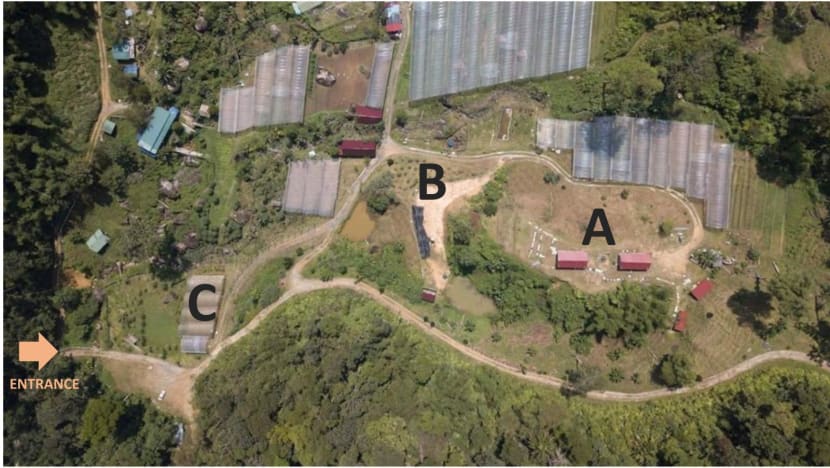
They saw a man who urged them to save his wife and son. Ms Tan Ei Ein and her son Zech Loh, 7, were trapped in an overturned car, the engine still running.
Ms Tan pressed on the horn so firefighters could pinpoint their location. Mr Zapri approached the half-buried car. He saw Ms Tan holding on to her son’s exposed leg, tightly. Zech was in the back but covered in earth.
The firefighters pulled them out through the shattered windows. Ms Tan was injured but conscious. Zech was unconscious. They tried chest compressions, but they knew he was no longer alive.
Mr Zapri shone his torchlight around in the dark. At every flick, he could see bodies sticking out of the mud, some of which were partially submerged.
“I was really sad. There were a lot of bodies but we couldn’t go to them yet, because we needed to help those who were alive first,” he said.
Friday, 5am: The realisation
Mr Ling woke up in his home in Kepong, northern Kuala Lumpur at 5am, for some reason an hour earlier than usual.
His wife, Ms Liu, and their elder of two sons had left for a camping trip “near Genting” on Wednesday. Ms Liu, a teacher at nearby Mun Choong primary school, had gone on the trip with some colleagues and students.
The husband of one of the teachers worked as a campsite supervisor at Father’s Organic Farm, so this was a way for them to support him.
Mr Ling promised his wife and son that he would try to visit them at the campsite on Thursday. But he did not as he was caught up with meetings at his job as a condominium manager.
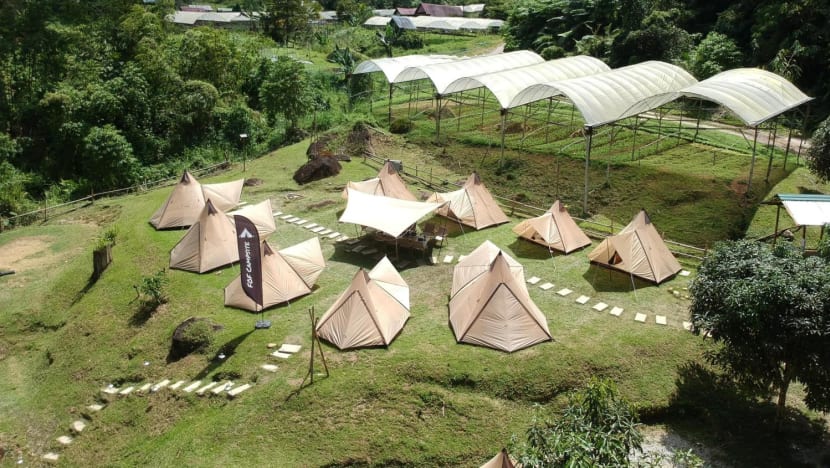
Mr Ling checked his phone. His wife last sent a WhatsApp message on Wednesday morning, reminding him to eat. He also checked social media. “Why are a lot of people talking about a landslide?” he asked himself.
Mr Ling looked at the photos. They were dark and blurry, and showed pictures of people at a campsite in “Batang Kali”. He went to the toilet and googled Batang Kali. It was near Genting.
Mr Ling called his wife and son but could not get through. He called the campsite supervisor and his wife. He could not get through to them either.
“I started getting scared,” said Mr Ling.
He called the younger sister of his wife’s colleague, who confirmed that the landslide had hit the campsite. The campsite supervisor - her brother-in-law - was taken to hospital, she said. She also told Mr Ling to find his wife and son at either Selayang or Kuala Lumpur hospital.
Friday, 7am: Hasty search
Back at Father’s Organic Farm, rescuers continued with what they call a “hasty search” well past daybreak. They used spades and shovels to dig for survivors within the “golden hour” - a small window where victims have the highest chances of survival.
Firefighters carried out Ms Tan and her son Zech. Then they pressed on. They came across a man half buried in earth, begging them to save his mother instead. They also found a woman digging furiously in the mud for her niece, sobbing and pleading with rescuers to find the girl.
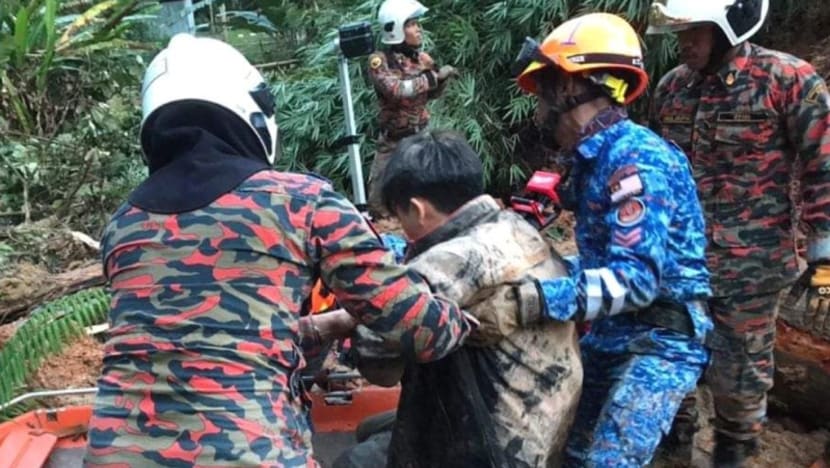
By then, Senior Fire Superintendent II Mustakim Rimon, a senior officer with the Selangor Fire and Rescue Department, had arrived to bolster rescue efforts.
As the highest-ranking firefighter at the time, he assumed operational command and started by plotting an escape route in the event of a secondary landslide. Then he went to help the others.
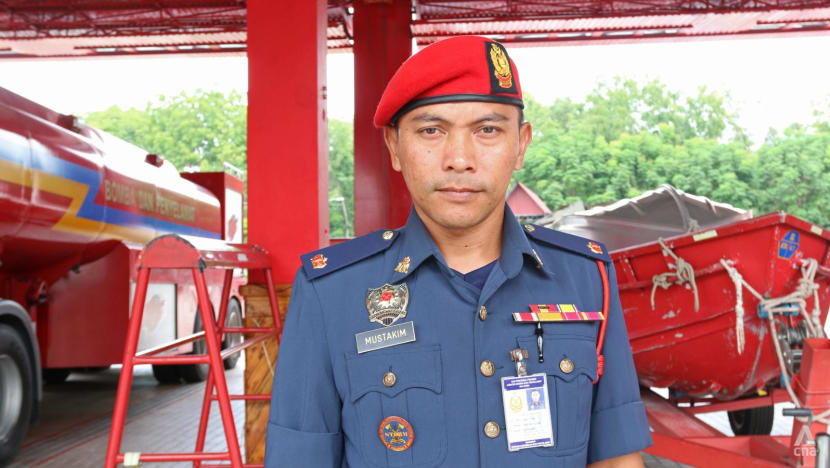
Mr Mustakim, 40, told the disconsolate woman to rest and took over the digging.
“She kept asking if her niece will be alive. We were forced to lie to calm her down. We said there was a possibility that she was still alive, and that we will pull her out as fast as we can and bring her to paramedics outside,” he said.
“But deep in our hearts, we knew that the possibility was really low. We found the niece not breathing and without a pulse.”
In those first few hours, another 21 people were evacuated, bringing the total number of survivors to 59. Rescuers would eventually pull out another two survivors, all on that first day. They found no more.
Friday 11am: Recovery phase
When rescuers only found bodies past 11am, they brought in excavators to switch to what is termed the “recovery” phase. These heavy machines and their operators were paired with sniffer dog teams to more efficiently dig for bodies.
The earth reached a thickness of about 5m in some areas, so the excavators carefully dug through layer by layer, stopping when a sniffer dog picked up a scent or if they hit items like sleeping bags or damaged tents, which indicated that a body was nearby. Rescuers would then manually take over.
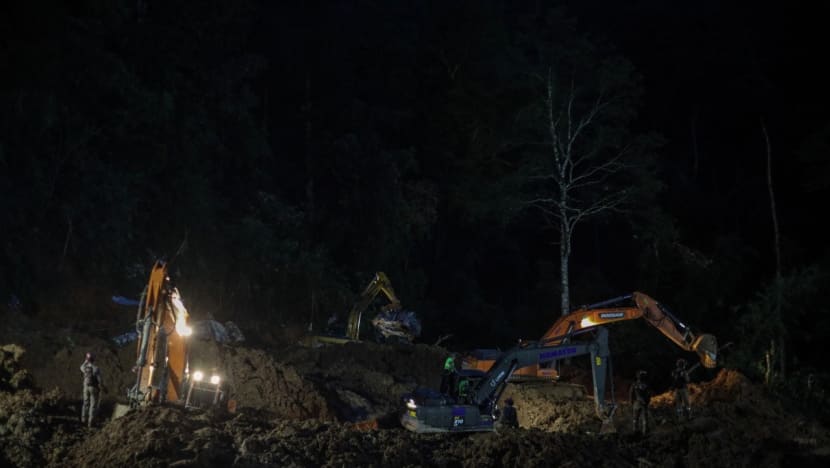
Still, it was a long and arduous process.
The excavators sank in the soft mud and the small stream that had sprouted in the middle of the landslide.
When it rained, rescuers paused. The wet soil made it even more difficult for rescuers and excavators to move. Spotters whose only job was to watch the surrounding valleys for secondary landslides would not be able to see clearly either.
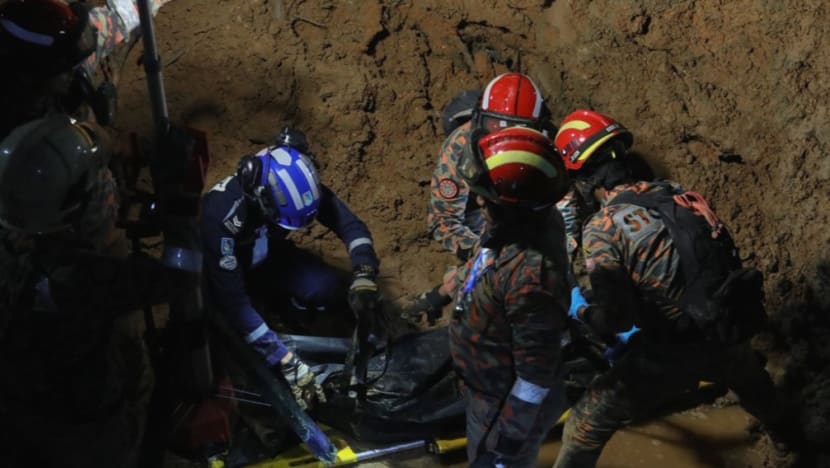
As the operation dragged on, more agencies - including the police, military and elite rescue teams - got involved. Telecommunications workers also came with equipment to boost mobile reception in the area.
Mr Zapri and his colleagues from Kuala Kubu fire station remained in the “red zone” - the core rescue area - exhausted but toiling away.
“Together with Genting fire station, we were the first responders so we knew where everybody was, where the tents were, where the victims were,” he said.
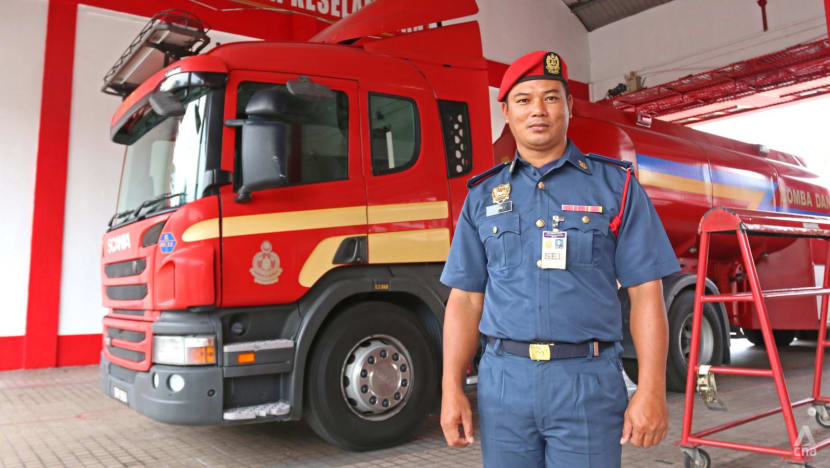
While Mr Mustakim said the undulating slopes and soft earth made it tiring for firefighters going in and out of the red zone, he recounted how survivors kept thanking them as they trudged past.
“When we heard this, our fatigue disappeared. Instead, we felt really encouraged,” he said.
Friday, 2pm: Anxious wait
At Selayang hospital, Mr Ling felt discouraged. He found himself waiting around for news of his wife and son. He wanted to go to the campsite himself but was told that the entire area was closed off.
Mr Ling heard that some survivors had been transported to Ulu Yam police station, so he drove there instead. There, he saw one of the survivors crying. She was the one digging for her niece. The woman broke down and told him that her niece did not make it.
“I asked if she saw anyone else, but she said no. I went there and waited but my heart was not feeling well,” he said.
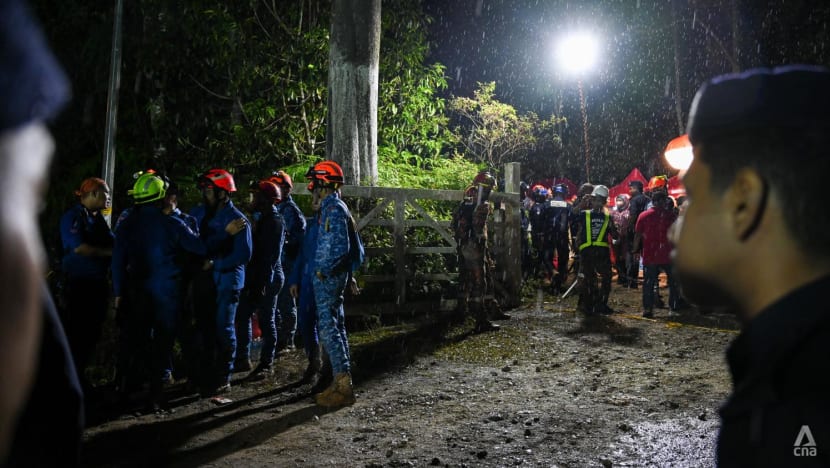
The day took a more positive turn when he was informed that his son could be in Kuala Lumpur hospital, but that this person was surnamed Lim instead of Ling.
Mr Ling thought this could have been a spelling error, so he dispatched his younger son to that hospital anyway. He asked his son to take a photo of the victim and send it over.
Indeed, it was his son Ling Zi Xuan, 22, who was warded in the hospital. “OK, it's him. I got one, so my heart eased a little,” he said. “Now, it’s time to focus on my wife.”
By this point, Mr Leong, Mr Wong and their families had waited at the police station for hours. They soon saw fellow survivors stream in crying, distraught at losing their loved ones, as the scale of the tragedy dawned on them.
Friday evening onwards: Crushing news
Mr Ling was still looking for his wife, but he spent the final few hours of Friday losing hope.
“I thought to myself: Time has passed and those buried in the landslide were unlikely to survive,” he said. “If my wife was sent to other hospitals, she might be unconscious. So, I’ll just wait.”
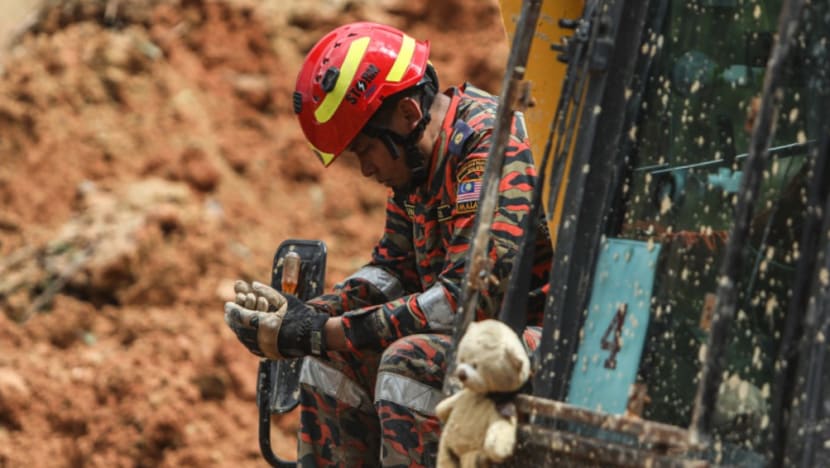
Mr Ling was told that some bodies had been sent to Sungai Buloh hospital, so he nonetheless decided to go there.
He wanted to see if his wife was among the deceased there, but doctors said he had to wait. His wife’s sister had also deposited her DNA at the hospital to help with any potential identification.
Another agonising period of waiting followed, and Mr Ling was told to return the next morning.
He left and headed to Kuala Lumpur hospital to be with his son. Doctors said Zi Xuan had injured his back.
“My son asked me, ‘Where’s mum?’ I said I’m still finding her - I didn’t wanna tell him the real truth (about my fears),” he said.

On Saturday before noon, Mr Ling got to Sungai Buloh hospital and heard the news he was dreading.
Doctors told his sister-in-law that there was a DNA match with one of the bodies brought in, but she could not verify this from a picture of the deceased provided to her.
Mr Ling took one look at the photo and knew that it was his wife. “She always sleeps next to me, so I can see,” he said, falling silent.
He entered the morgue and confirmed that it was his wife. “I asked if I could take her out, because it was cold in there and I knew she was afraid of the cold,” he said.
An hour later, Ms Liu’s body was released. Mr Ling said according to Chinese custom, the spouse of a deceased should not follow the vehicle carrying the deceased to the crematorium. But he did not take heed.
“I don’t care about this, because my wife is already like this, so I followed her. I didn’t want her to be alone,” he added.
Present day: Anger, sadness and absence of closure
The rescue operation lasted nine days, only stopping at around midnight each day for the weary excavator operators to rest, until all 31 bodies were found. The final victim - a boy wrapped in a sleeping bag - was found on Saturday just before 5pm.
In the months that followed, the report recommended the development of a slope hazard and risk map for state roads, with regular inspections and maintenance of road assets carried out periodically.
The report also called for the enforcement of a law and guidelines covering camping and recreational sites.
“Without substantial evidence linking specific human activities to the landslide, it is reasonable to consider it as primarily a result of natural failure,” the report concluded, noting that slope or road maintenance was done according to schedule.
But victims’ families and survivors said the 141-page report did not address a 2013 environmental impact assessment (EIA) that said the area the campsite was operating in should not be developed.
The report did highlight that the landowner, Malaysia Botanical Gardens Resort, eventually got planning permission from the Hulu Selangor District Council to develop a resort and botanical garden on that plot of land, although it also pointed out that initial applications were rejected.
There is also a question of how Father’s Organic Farm, which had a permit to operate a farm, was also allowed to run a campsite there. A Selangor state government official had confirmed that the state did not grant licenses specifically for campsites. This issue was not addressed by the report either.
Ms Tan, who was trapped in the car with her son Zech, told CNA that the report provided “absolutely” no closure.
“The earlier EIA says this site is a no-go area. Why is it that the subsequent EIA allows development there?” the 44-year-old asked.
“The report is a great insult to the intelligence of the rakyat (people).”
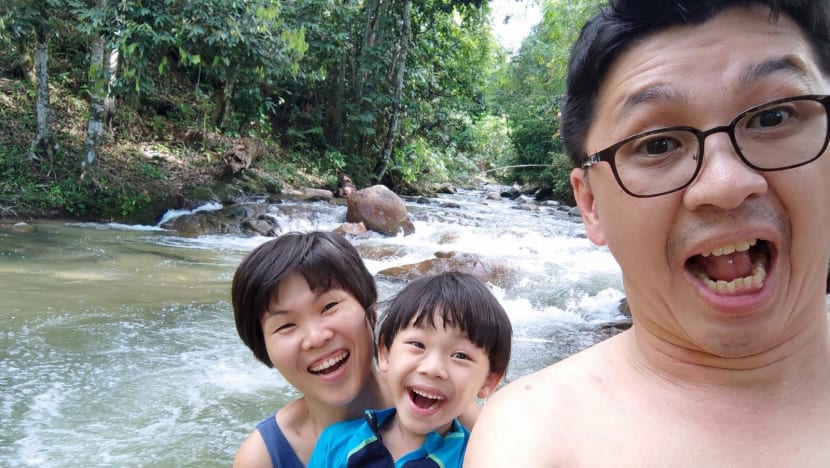
In a commentary criticising the handling of the incident report, former Petaling Jaya Member of Parliament Kua Kia Soong said developers and authorities had “exploited legal loopholes” by dividing projects into smaller parcels to bypass EIA requirements.
“In the wake of the Batang Kali tragedy, we must hold those responsible for negligence and corruption accountable,” he wrote in the piece published by Free Malaysia Today on Oct 19.
Ms Tan, a creative producer, called the loss of her only son a “tremendous nightmare”, saying that she gets flashbacks and yearns every day to “go back in time” and save him.
“He has never left my side since birth, except for attending dyslexia intervention classes. Like a little lamb he followed us wherever we went, even to our project sites,” she said.
Ms Tan’s injuries from a year ago have also had a lasting effect. Her left eye is constantly teary and blurry, while her once dislocated hip prevents her from walking or hiking long distances.
“Currently, we are merely existing. There has been very little joy and drive at work or at play,” she said, adding that she and her husband will remain in grief until the “day we die”.
“The only thing that kept us going is the determination to see accountability in the Batang Kali tragedy.”
Mr Leong, the other survivor who escaped largely unscathed, said a thorough and transparent investigative process should have involved an independent commission of inquiry and an avenue for victims to pose queries.
“We want a forum where all parties concerned gather, and then the government presides over it and answers our questions,” he said.
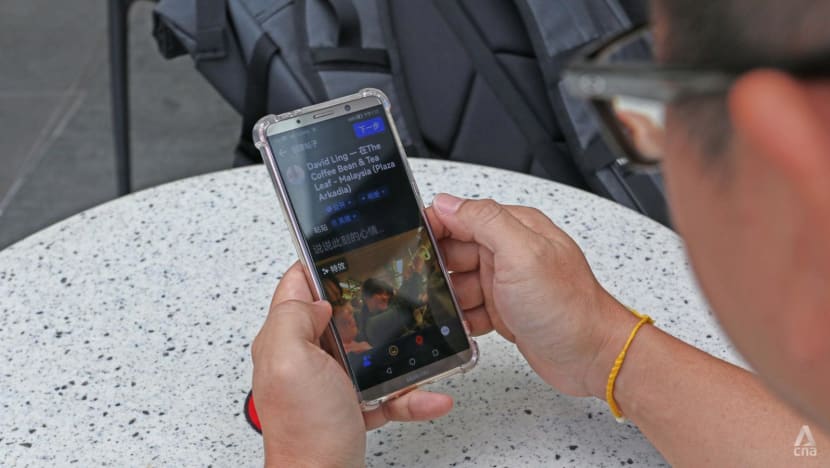
Mr Ling was similarly frustrated with the authorities, saying that the Father’s Organic Farm campsite had been advertised on social media and operating for two years in the post-pandemic rush to the outdoors.
“The district council should know that there are other businesses there,” he said, stressing that Father’s Organic Farm was only authorised to operate a farm. “If you say you don’t know, I can’t accept it.”
For Mr Ling, the death of his wife has left a gaping hole. Everything he did - going on holiday, buying tickets to the movies - was done in twos, he said. Now it is not like that.
To relive the memories of their 22-year marriage, he constantly looks up their old Facebook posts. When he hears her favourite songs in the car, he tears up. Still, he tries to maintain a brave front for his son.
Zi Xuan recently replaced the batteries in his mum’s favourite watch. “I better change it - if not she would have scolded me,” Mr Ling recalled him saying.
His son’s back injury means he should avoid activities that require him to bend for long periods of time, like riding a bicycle or motorbike.
Mr Ling’s troubles are less physical. He has difficulty sleeping, but his doctor has advised him against sleeping pills for fear of overdose. He is also speaking to a counsellor, who tells him to go out and maintain a healthy social life.
But some things, he refuses to change.
“My wife was a teacher - teachers have a lot of things. A lot of places in the house are filled with her things - books, pens, rubbers. I’ve arranged her things but only a bit,” he said.
“It’s difficult, I can’t bear to do it.”


















